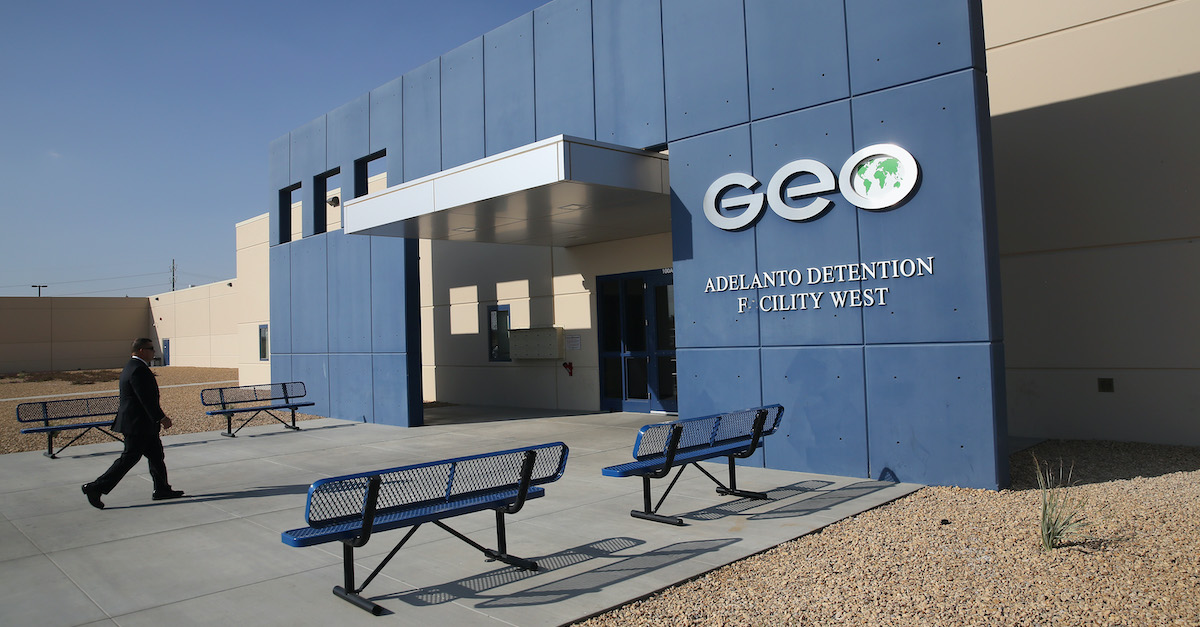
Backing the Geo Group’s effort to overturn a California law banning for-profit immigration detention centers, an attorney for the Biden administration’s Department of Justice urged the Ninth Circuit to strike down what he called the state’s “extreme” statute.
President Joe Biden campaigned on a platform that included ending private immigration facilities.
“No business should profit from the suffering of desperate people fleeing violence,” Biden declared in his immigration platform, starkly contrasting his position from his predecessor’s.
Taking a remarkably different stance in court on Monday, Biden’s Department of Justice went to a federal appeals court in Pasadena asking a panel of judges to block a California Assembly Bill 32, barring his administration from contracting with Geo Group and other private contractors in that state.
The Justice Department’s appellate litigation attorney Mark Stern argued on Monday that federal law preempts California’s legislation, alternatively describing the state’s law as “extreme” and “extraordinary.”
“If we picture states throughout the country deciding for various public policy reasons that they’re going to be—maybe not even as extreme as this—but that they are going to make it difficult or in this case impossible for the federal government to contract to perform its operations,” that would be a “pretty extraordinary thing,” Stern argued.
“This is pretty extraordinary in and of itself, and again, California offers no instance—none—in which anything like this has ever been sustained,” he added.
California Deputy Attorney General Gabrielle Boutin denied the Justice Department’s argument.
“The law is an exercise of the state’s sovereign authority and does not violate the Supremacy Clause,” Boutin told the three-judge panel.
“These facilities create threats to the health and welfare of these detainees,” she added. “There is a well documented record of that, and that was the purpose of this law.”
U.S. Circuit Judge Bridget Bade, a Donald Trump appointee, noted that the California law does not bar private immigration facilities operated by the state.
“So, minors, people with mental health issues, people in rehabilitation centers, halfway houses, California is not concerned with their health and safety?” Bade asked pointedly.
Boutin replied that California is “absolutely concerned” about the health and safety of those people but there is not the same record evidence of the same problems existing.
The distinction may be academic: When U.S. Circuit Judge Kenneth Lee, another Trump appointee, asked whether California had any private facilities in operation, Boutin answered no.
The American Civil Liberties Union also argued in court in favor of California, its Governor Gavin Newsom and its attorney general Xavier Becerra. The group’s lawyer argued nothing in the U.S. Constitution barred California’s action.
“The Framers of our Constitution vested all legislative powers in Congress alone,” the ACLU’s lawyer Jordan Wells said. “This appeal centers on a highly consequential federal policy, yet the plaintiffs cannot locate any plausible positive authority for the sprawling system of privately run ICE detention centers.”
Last October, U.S. District Judge Janis Sammartino largely upheld AB 32, which later took effect on Jan. 1. In her ruling, Judge Sammartino found that federal law does not expressly authorize U.S. Immigration and Customs Enforcement to contract with private prison operators, in contrast to statutory language governing the U.S. Marshals service.
“Congress clearly authorized USMS to use private detention facilities in limited circumstances, such as where the number of USMS detainees in a given district exceeds the available capacity of federal, state, and local facilities,” Sammartino wrote, granting a limited injunction barring application of the law to that agency.
Geo Group’s lawyer Michael Kirk argued that every appropriations bill since AB 32 was enacted allowed private detention facilities.
U.S. Circuit Judge Mary Murguia, a Barack Obama appointee rounding out the panel, noted that those appropriations bills related to criminal code, not immigration.
Kirk echoed the Biden administration’s claim that allowing states to dictate the federal government’s contracting practices would be a slippery slope.
“There’s no stopping point to the state’s theory,” Kirk said. “If states can impede the operations of the federal government by prohibiting person within their boundaries and contracting for services, the federal government has no principled basis for limiting the state’s regulatory power over government employees.”
The Ninth Circuit reserved decision on the matter.
(Photo by John Moore/Getty Images)